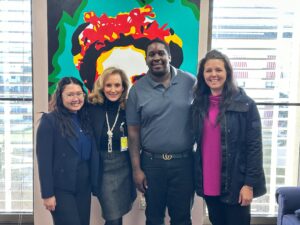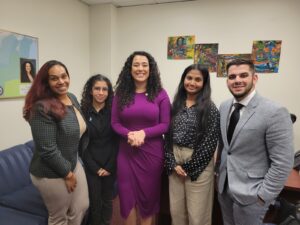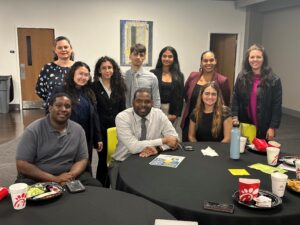Advocacy Spotlights: ASPIRE, Graduate Miami-Dade, and Achieve Palm Beach
ASPIRE
Formed in 2018, ASPIRE is the local college access network (LCAN) servicing Leon, Gadsden, and Wakulla counties. ASPIRE works to ensure that all of their students are college and career ready, based on their desired pathway, with the necessary skills to positively impact their communities. ASPIRE recognizes that certain labor shifts in demand could adversely impact traditionally underserved communities. With this in mind, this collaborative community leverages the assets of partner organizations and community stakeholders in order to best scale educational and workforce opportunities appropriately.
ASPIRE participated in FCAN’s 2022-2023 Advocacy Fellowship, along with students Alex Patrick and Sharry Anne Solis, to advocate for emergency aid and increase awareness around career and technical education (CTE) pathways in Florida. Click here to learn more about ASPIRE and their work serving the Capital region.

Sharry Anne Solis, Alex Patrick, and Morgan Evers (ASPIRE Lead) with Rep. Allison Tant (D-9)
Student: Alex Patrick
Alex Patrick credits his experience as a student fellow as “one of the most memorable learning experiences” he’d had. Initially having stopped out of high school, Alex enrolled in an adult education program last year and earned his GED “after giving up on it as a teen.” Alex realized he wanted to continue to pursue further education and in turn, studied for entry into fire school to become a firefighter. Alex credits Florida’s CTE system for his ability to pursue this career pathway. Alex was not drawn to the “structure of a college class” but knew he wanted to pursue this certificate to achieve his dream of being a firefighter.
He enrolled in fire school at the beginning of this year, taking his classes at night after his work day. Although this provided him with a heavy workload, he was not discouraged and successfully graduated from fire school. Alex is now a certified firefighter!
Congratulations Alex!
Student: Sharry Anne Solis
Sharry Anne Solis is a recent graduate of Florida State University (FSU), where she earned her bachelor’s degree in family and child sciences. Her familial responsibilities while navigating her journey to earn her degree allowed her to become an advocate for emergency and need-based aid.
“During my entire undergraduate career, I was living at home due to family responsibilities. Despite Florida having the second-lowest tuition in the country, low-income families and students face financial burdens through additional college costs. Cost is a main factor for students to drop out, [making] the need for financial assistance dire.” Emergency aid is a critical college retention tool for supporting students who face economic shortfalls that might disrupt their college education. 78% of state college students who dropped out said it was because of financial reasons.
Sharry Anne shared that before the pandemic, she was working two jobs, in addition to being a full-time student, in order to pay for additional college costs. “During the height of the pandemic, I lost one of the two jobs I had. While I still had another job, it was not enough to sustain myself. Emergency aid from my institution gave me the opportunity to use those funds to pay for the additional fees that I was struggling to provide due to being laid off.”
Graduate Miami-Dade
Graduate Miami-Dade is the premier LCAN of professionals across Miami-Dade County looking to bridge the inequity gaps in education, with an emphasis on serving special populations, FAFSA completions, advocacy, and pathways to postsecondary success. Graduate Miami-Dade was joined by Natalie Gelman and Gayathri Samuel who advocated for a universal FAFSA policy. Click here to learn more about Graduate Miami-Dade and some statistics they cite that have encouraged them to advocate for this policy change.
Student: Natalie Gelman
Natalie Gelman completed her first year at Miami Dade College, studying political science. Her experience during high school, navigating college and university paths, caused her to realize that cost was a “block in the road.”
“With two working class parents, I knew finding funding for college would be difficult. Through struggle, I persisted and found scholarship opportunities at Miami Dade College. My FAFSA application helped me greatly and helps many other students just like me nationwide.” In retrospect, she noticed that many of her peers did not know about the FAFSA and Pell Grants associated with the application. Every year, the Florida high school graduating class misses out on over $300 million in Pell Grants because they do not complete a FAFSA application. The majority of Florida college students use a combination of federal, state, and college-based aid to pay for college, making the FAFSA integral to unlocking aid for students attending a variety of postsecondary institutions, including technical colleges.

Katherine Leiva (Graduate Miami Dade Lead), Natalie Gelman, and Gayathri Samuel with Senator Alexis Calatayud (R-38)
Natalie recalls her experience as a student fellows and sums it up as “life-changing”, stating that the fellowship program has allowed her to “advocate for ways we can increase attainment rates in my community and the state of Florida.”
Student: Gayathri Samuel
Gayathri Samuel is a student at the University of Miami (UM). Almost done in her undergraduate journey, she is studying business law and health management. “Throughout my time as an FCAN fellow, I had the privilege of engaging in comprehensive professional development opportunities that have equipped me with invaluable skills, knowledge, and perspectives.” Through her own experience and working with Natalie, Gayathri understands how valuable the FAFSA application can be for a student.
Students who complete the FAFSA are more likely to enroll in a postsecondary program, persist in their coursework, and obtain a degree or credential. However, about half of Florida’s high school seniors fail to complete the FAFSA each year and the students who stand to benefit the most, including low-income and first-generation students, are the least likely to complete the form.
“As a student fellow, I was empowered to be a true advocate for these issues. My personal experience as a postsecondary student has allowed me to relate to the challenges faced by other students, firsthand. By sharing my own journey, I can connect with others and amplify my voice to effectively advocate for change.”
Achieve Palm Beach
Since 2015, Achieve Palm Beach has been uniting the community and focusing on improving access to and completion of an education beyond high school. Achieve Palm Beach was joined by student, Humberto Sigler-Finales to advocate for universal FAFSA. In Palm Beach County alone, students left behind $29.7 million in Pell grants on the table in 2022. Click here to learn more about Achieve Palm Beach and their various “teams” that focus on financial supports, career pathways, and advising.
Student: Humberto Sigler-Finales
Humberto Sigler-Finales is a first-generation college student, working to earn his bachelor’s degree in psychology at Florida Atlantic University (FAU). “I had limited knowledge of opportunities on pursuing my postsecondary education. All I knew was that college was going to be expensive and that my parents were only going to e able to provide limited financial help.” Humberto credits a college prep program at his high school, TRIO, that provided him with the tools and information he needed to learn about the FAFSA and the financial benefits the application offers.
After filling out the FAFSA, Humberto was “stunned” to see the aid he was eligible for under the Pell Grant. Knowing that this aid was now available to him, he was able to focus on studying and receiving an education without much financial strain. Aid can help students enroll, but also stay in school. According to the National College Attainment Network (NCAN), with every $1,000 a student receives in aid, persistence increases by four percentage points.
Since Humberto began his postsecondary journey at FAU, he’s almost completed his bachelor’s degree and currently does not hold any student debt due to the Pell Grant. Since this financial pressure was removed, he’s been able to save up money to continue his education in experimental psychology in a graduate program.

22-23 Advocacy Fellows with Leon County School Board Member, Mr. Marcus Nicholas (District 5).
Humberto says he wanted to participate in FCAN’s advocacy fellowship to “raise awareness” for other students like him.
To learn more about the statewide collaborative movement to increase college degree attainment, visit the different areas of FCAN’s webpage.
RELATED ARTICLES:
